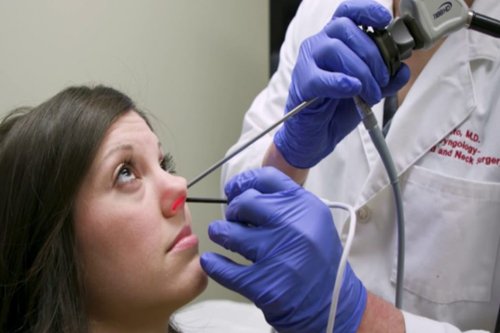Brain and ENT Clinic – Dr Lalit Mahajan In Nagpur & Dr Rachna Gangwani Mahajan In Nagpur
Nasal Endoscopy

Nasal endoscopy, also known as rhinoscopy or nasendoscopy, is a medical procedure that involves the use of an endoscope to visually examine the inside of the nasal passages and other structures in the nasal cavity and upper respiratory tract. An endoscope is a thin, flexible tube with a light and a camera on its tip, allowing healthcare professionals to see detailed images of the nasal anatomy in real-time.
Diagnostic: Nasal endoscopy is often used as a diagnostic tool to evaluate various nasal and sinus conditions. It provides a detailed view of the nasal passages, septum, turbinates, and other structures.
Symptoms of Nasal Endoscopy
Discomfort or Pressure:
- Mild discomfort or a feeling of pressure in the nasal passages is common during the insertion and movement of the endoscope. However, this discomfort is typically minimal.
Tickling or Itching Sensation:
- Some individuals may experience a tickling or itching sensation in the nose as the endoscope is navigated through the nasal passages.
Slight Nosebleed:
- A small amount of bleeding from the nasal passages may occur, particularly if the endoscope contacts sensitive tissues. This is usually minimal and resolves quickly.
Watery Eyes:
- Stimulation of the nasal passages during the procedure may cause temporary tearing or watery eyes.
Sneezing or Nasal Irritation:
- The presence of the endoscope in the nasal passages may trigger a natural response, leading to sneezing or nasal irritation. This is generally transient.
Treatment of Nasal Endoscopy
Medications:
- Nasal Sprays: Corticosteroid nasal sprays may be prescribed to reduce inflammation in the nasal passages and manage conditions such as allergic rhinitis or chronic sinusitis.
- Antibiotics: If bacterial infection is identified, antibiotics may be prescribed to treat the infection.
- Decongestants: Nasal decongestants may be recommended to relieve nasal congestion, especially in cases of acute sinusitis.
Nasal Irrigation:
- Saline Irrigation: Nasal irrigation with a saline solution can help flush out mucus and allergens, providing relief for conditions like chronic sinusitis.
Allergy Management:
- If allergies are contributing to nasal symptoms, allergy management strategies may be recommended, including allergen avoidance, antihistamines, or allergy immunotherapy.
Surgical Interventions:
- Septoplasty: If a deviated septum is identified as a cause of nasal obstruction, surgical correction (septoplasty) may be recommended.
- Turbinoplasty: Surgical reduction of enlarged turbinates may be performed to improve nasal airflow.
- Sinus Surgery: In cases of chronic sinusitis or nasal polyps, endoscopic sinus surgery may be considered to remove polyps, open blocked sinuses, and improve sinus drainage.
Polyp Removal:
- Nasal endoscopy can be used to guide the removal of nasal polyps, either through medication or surgical procedures.
Benefits of Nasal Endoscopy
Accurate Diagnosis:
- Visual Inspection: Nasal endoscopy provides a direct and magnified view of the nasal passages, allowing healthcare professionals to assess the nasal anatomy, identify abnormalities, and diagnose various conditions.
- Detailed Examination: It helps in evaluating the nasal septum, turbinates, sinuses, and other structures for signs of infections, inflammation, polyps, tumors, or structural abnormalities.
Treatment Planning:
- Guidance for Surgery: Nasal endoscopy is often used to guide surgical procedures, such as functional endoscopic sinus surgery (FESS) or septoplasty. The real-time visualization helps surgeons navigate and address specific issues more precisely.
Sinus and Nasal Disorder Management:
- Identification of Conditions: It aids in diagnosing and managing conditions like chronic sinusitis, nasal polyps, deviated septum, and nasal tumors.
- Biopsy: Nasal endoscopy allows for the collection of tissue samples (biopsy) from suspicious areas for further examination and diagnosis.
Treatment of Nasal Blockage:
- Removal of Obstructions: Nasal endoscopy can be used to remove obstructions, such as polyps or foreign bodies, that may be causing nasal congestion or breathing difficulties.
Allergy Management:
- Identification of Allergic Conditions: It helps in assessing allergic conditions affecting the nasal passages and identifying allergic triggers.
